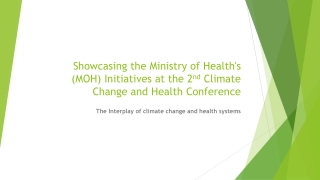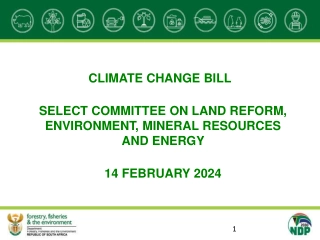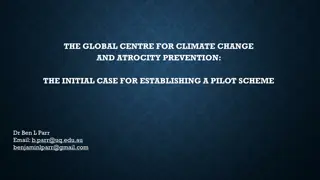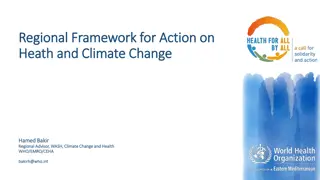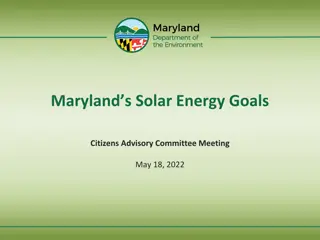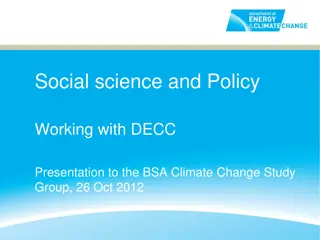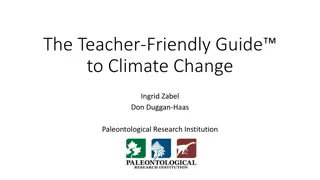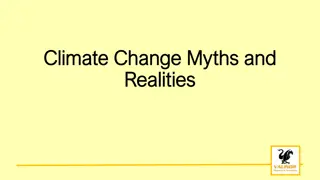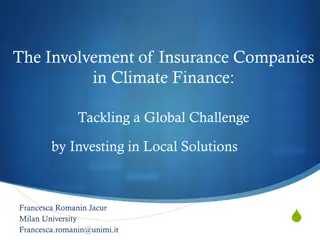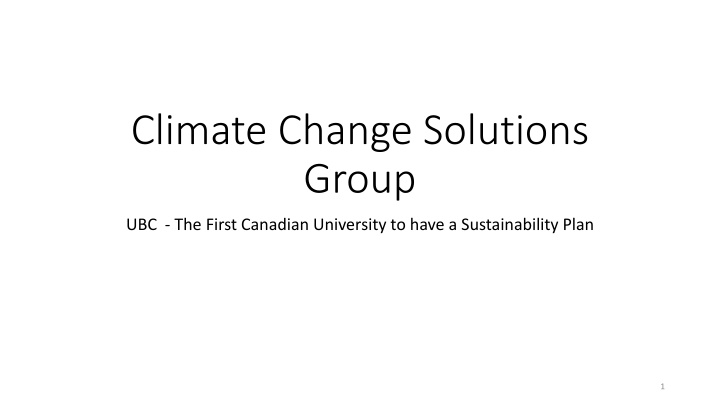
Climate Change Solutions Group
University of British Columbia (UBC) has implemented various sustainability measures to reduce greenhouse gas emissions, focusing on building efficiency, energy conservation, and sustainable practices in food services. By converting energy systems, implementing tune-up programs, and supporting net-positive building designs, UBC has achieved significant reductions in emissions. Additionally, their food services prioritize sourcing local ingredients and sustainable seafood to promote environmental responsibility.
Download Presentation

Please find below an Image/Link to download the presentation.
The content on the website is provided AS IS for your information and personal use only. It may not be sold, licensed, or shared on other websites without obtaining consent from the author. If you encounter any issues during the download, it is possible that the publisher has removed the file from their server.
You are allowed to download the files provided on this website for personal or commercial use, subject to the condition that they are used lawfully. All files are the property of their respective owners.
The content on the website is provided AS IS for your information and personal use only. It may not be sold, licensed, or shared on other websites without obtaining consent from the author.
E N D
Presentation Transcript
Climate Change Solutions Group UBC - The First Canadian University to have a Sustainability Plan 1
Buildings 2010 2015 30% Reduced GHGs majority of UBC s emissions come from buildings success to date has been achieved by: 1. Converting Academic District Energy System (ADES) from steam to hot water 24% increase in overall energy efficiency proportional savings in operations and reductions in GHGs; 2. Establishing Bioenergy Research and Demonstration Facility (BRDF) provides renewable heat and power to the ADES; 3. Implementing Building Tune-Up Program improve energy and emissions performance in existing buildings 2
Existing Buildings Tune Up Program Use Wi-Fi occupancy data to help with building occupancy and optimize building energy performance Auditing building systems where appropriate, including sensors, lighting and mechanical insulation Integration of audits and analysis outputs into project planning Reduce thermal demand through use of high-efficiency mechanical equipment In renovation projects, use equipment choices that impact sustainability performance (particularly energy and water consumption), especially in UBC s 400 labs Use expert software systems including automated fault detection systems to manage operations and maintenance for energy efficiency 5
New Buildings Support building design teams in Net Positive building design Net Positive buildings that do not require energy input, and do not produce any net emissions Stronger focus on life cycle costs Organize student design competitions for energy efficient UBC buildings - contributing innovative design aspects and research To date UBC s energy conservation program has resulted in an annual savings of 28,400 tons in GHGs, equivalent to taking 6,200 cars off the road for a year 6
Food On Campus (except franchises) 60% of UBC Food Services ingredients purchased from local producers (within 400km of UBC) Sustainable Seafood All seafood is 100% Ocean Wise certified Fair Trade Fairtrade certified products, including all our coffees and teas, available at all UBC Food Service Locations Food Recovery Partner with local organizations to deliver food, that s still safe but can't be sold, to local community groups 7
Food on Campus Goal is to divert 80 % of our operational garbage from the landfill by 2020 Have a closed-loop system for food scraps collected: we turn food and plant waste into compost used for gardening on campus By keeping plastic out of food scraps stream, we turn the 5 tonnes of organic waste UBC produces daily into a clean compost In res dining rooms, save 20 when you use Green2Go containers. When you use a disposable container you add it to the waste stream and it will cost you 75 . Save a disposable container from the waste stream and become a UBC Zero Waste hero. 160,000 disposable containers enter the waste stream at UBC each year. That s worth over $85,000! BYOC beverage prices down by 25 cents but no cup, you pay 25 cents 8
Roots on the Roof A 100% student-run club that manages the rooftop garden space and community garden plots on roof of AMS Student Nest To grow and harvest food sustainably Develop and conduct food literacy workshops around food, culture, health, and sustainability To create an inclusive space for social engagement and opportunities to explore, learn, and actively take part in food system initiatives. 9
Orchard Garden Community by Faculty of Land and Food Systems By sheet mulching with cardboard, then with wood chips, able to prevent weeds from emerging through the cardboard ('sheet') barrier all season Use cardboard because it's biodegradable, easily accessible and costs nothing The wood chip covering decomposes and adds nutrients and organic matter to the soil food web, while also slowing the emergence of weeds in the long term It's nicer to look at than cardboard and holds it in place 10
UNA Community Gardens The University Neighbourhoods Association (UNA) has three vibrant community gardens available for residents They are extremely popular and provide an opportunity for residents to grow food and flowers, as well as to connect with each other 11

